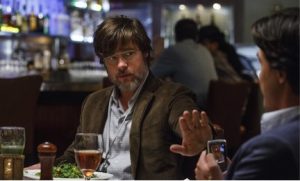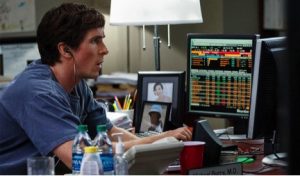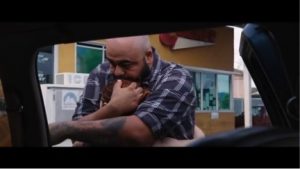Review: The Big Short
By Kolbe Murray
The Big Short (2015) is an ambitious attempt to capture the story of key players in the 2008 Great Financial Crisis (GFC). Unethical behavior exacerbated the problems and compounded the disastrous consequences. An analysis of two acts spotlighted in The Big Short indicates one (shorting) is not wrong per se and another (ratings by S&P) as unethical.
The Ethics of Short Selling
Historically, short selling or shorting is viewed negatively and some call it as “betting against the home team.” In The Big Short Ben Rickett (Brad Pitt) reprimands his two business partners, Charles Geller (John Magaro) and Jamie Shipley (Finn Wittrock), when they dance in the lobby of a Las Vegas hotel after successfully completing business deals to short triple A mortgages. Rickets says, “If we’re right, people lose homes, people lose jobs, people lose pensions. Here’s a statistic for you, for every 1% unemployment rises, 30,000 people lose their lives.” Yet, the tragic events Rickets describes are a consequence of a crash in property prices, not of shorting securities linked to the property.
The maligned character of shorting is not entirely deserved. Shorting provides benefits to the economy such as liquidity, lower volatility, and market information. These factors lead to better price discovery and thus, are useful as checks against overpricing. Short selling also provides a measure of stability to investors, who use the technique to hedge portfolios against risk. Additionally, short positions reinforce the idea that prices can in fact go down, as many in the market thought it was impossible for the housing market to decline.
In this scenario, we must separate the result of Geller and Shipley being on the right side of the short, and ordinary Americans losing homes. The homes will be lost despite the shorting. After examining the actual prospectuses of the mortgage-backed securities, Michael Burry comes to the conclusion that logically, the housing market must collapse. Geller and Shipley make money when the default rate rises, but they are not the cause of the increasing defaults. They forecast a crash in prices and acted to profit from this prediction. Their act of shorting is not unethical.
Transparency
While it was not illegal for Burry to create such a huge short position, Burry’s boss says, “We had an understanding.” Burry fulfilled part of his duty by doing impressive in-depth research. Although not stated in the movie, Burry had all of his savings in this fund, proving he had “skin in the game”. Despite this personal investment, Burry still wanted a larger amount of money in the fund because his net worth was not enough. At the time of the investment, people thought shorting the housing market was not a profitable enterprise, especially as doing so was not even possible when the fund was initially created. To get the funds, Burry did not inform his investors his plans to have Wall Street create a huge short position in the housing market. This move was unprecedented because shorts against the housing market did not exist at that time. Burry’s risk tolerance may have been higher than his investors. It seems that a lack of communication was the biggest problem. It may have been imprudent to have a huge short position. Burry also lacked humility because no amount of due diligence can guarantee a profitable trade. As Keynes said, “The market can stay irrational longer than you can stay solvent.”
The movie lionizes Burry as a person who outsmarted villainous Wall Street. But Burry took on an enormous amount of risk and was lucky he could pay the premiums. If fund investors understood Burry was going to short the housing market, they would not have agreed to be in the fund and therefore, his action of creating a huge short position without being fully honest and transparent with investors was unethical.
The Ethics of S&P
Later in the movie, Mark Baum (Steve Carrel) and Vinny Daniel (Jeremy Strong) interview S&P. The rating agencies were at best complacent and at worst fraudulent and complicit in creating the financial crisis. The S&P rater says “Look, if we don’t give them a triple A, they’ll go right down the street to Moody’s.” For the sake of lucre, the ratings agency did not give an honest assessment of the bonds, instead giving a false impression of the riskiness of Mortgage Backed Securities (MBS). While S&P and the banks gained millions of dollars worth of utility, the catastrophic negative utility millions of others had to bear in lost homes, jobs and assets clearly outweighs S&P’s profits. The act of giving misleading high ratings to poor quality securities for the sake of personal profit is unethical.
Examining the rating issue using a Kantian duty based framework, S&P’s act also comes out as unethical. A rating agency’s role is to provide informed guidance on the riskiness of bonds. If a rating agency assigns a triple A rating to an extremely risky mortgage, the agency is clearly violating its integrity and derelict in its duty of providing impartial, expert guidance. As post-hoc rationalization, S&P may feel justified in saying, “We thought these mortgages were of the highest quality.” The key verb is “thought”. If the rating agency honestly believed an extremely risk bond was of the highest quality, it would not have done anything wrong, it would simply be doing a poor job. The fact S&P staff admitted giving higher ratings for fear of losing business runs counter to that defense. S&P was morally bound to tell the truth and engage in its business transactions with clients with integrity.
S&P’s response to Baum’s inquiry is to assert Baum wanted the ratings changed for personal benefit. While the change of ratings would benefit Baum, he was not buying the rating. His intent, unlike the banks, is for ratings to be accurate representations of bond risk. Rationally, the ratings on the mortgage-backed securities should decrease when default of the underlying assets, the measure of riskiness, increases.
Another case involves the Florida real estate brokers. In their search to assess the riskiness of the housing market Mark Baum and his team interview brokers’ clients, known ironically as strippers. One stripper tells Baum that her broker assured her interest rates would not increase. Baum replies, “Well, he’s lying. Actually in this case he’s wrong.” The movie implies the brokers were ignorant of the consequences of their actions. Yet, their actions are not excusable, because they should have exercised prudence.
The Ethics of CDOs and MBSs
Are MBSs and Collateralized Debt Obligations (CDOs) ethical financial instruments? Lewis Ranieri created the MBS in the 1970s. Jared Vennett describes the MBS as “simple and valuable, but it mutated into a monstrosity that collapsed the world’s economy.” An MBS can diversify risk of individual mortgages, but it also makes the overall risk more difficult to assess. Derivatives of MBS such as CDOs, synthetic CDOs and Credit Default Swaps (CDS) sprang up to meet different market needs.1 The complexity of derivatives created a moral hazard as individuals in banks had incentives to sell them to boost the bottom line, but their complexity made risk analysis difficult. Investors placed their trust in CDO managers, who selected the securities in the CDO portfolio and monitored the assets. In Las Vegas, Baum interviews a CDO manager, Mr. Chau, about who he represents. Mr. Chau claims he represents investors but failed to disclose the inordinate influence on securities selection wielded by a client hedge fund. This deliberate deception is unethical because it violates the trust that investors, whom he claimed to represent, placed in him.
The Big Short as Ethics Education
Given the inherent constraints of a film, The Big Short did a good job portraying events and ethical issues in the GFC. The movie consistently portrayed Wall Street as an evil entity that is separate from the economy. Yet, Wall Street is made up of individuals and the movie should have done more to encourage individual ethical behavior and integrity. Finance can be a dull subject, so I applaud The Big Short for presenting complicated transactions and instruments in an entertaining manner to a broad audience, encouraging people to think about ethics in finance.
Editor: Kara Tan Bhala
Photos courtesy of The Big Short, Paramount Pictures,
Citations
- Jo, Hoje, Claudia Lee, Adam Munguia, and Cantalina Nguyen. “Unethical Misuse of Derivatives and Market Volatility around the Global Financial Crisis.” Journal of Academic and Business Ethicsnd Business Ethics 2, p1 (2009)



